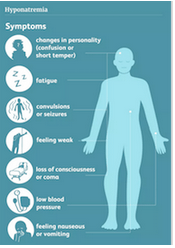HOW MUCH WATER IS OPTIMAL?
How to stay hydrated
Since 1991 there have been 10 reported deaths as a result of Exercise Induced Hypernatremia Encephalopathy (which in basic terms is too much fluid on the brain as a result of excessive fluid consumption).
However, there seems to be little evidence to suggest that exercise induced dehydration results in life threatening disorders. In fact, moderate dehydration resulting in a loss of between 2-8% Body Weight is not hazardous, with recovery occurring within minutes of drinking.
The invention of sports drinks in the late 1970's resulted in a very effective marketing campaign emphasizing the need for regular hydration with the goal to "stay ahead of thirst and drink as much as tolerated". This has lead to some athletes taking on so much fluid that they have weighed between 2-6kg heavier after a race. It is now suggested that a consumption of less than 3 litres over a four hour marathon.
It is supposed that very salty water ie. at greater concentrations than that found in blood would prevent this, however it is unpalatable and likely to cause vomiting.
However, there seems to be little evidence to suggest that exercise induced dehydration results in life threatening disorders. In fact, moderate dehydration resulting in a loss of between 2-8% Body Weight is not hazardous, with recovery occurring within minutes of drinking.
The invention of sports drinks in the late 1970's resulted in a very effective marketing campaign emphasizing the need for regular hydration with the goal to "stay ahead of thirst and drink as much as tolerated". This has lead to some athletes taking on so much fluid that they have weighed between 2-6kg heavier after a race. It is now suggested that a consumption of less than 3 litres over a four hour marathon.
It is supposed that very salty water ie. at greater concentrations than that found in blood would prevent this, however it is unpalatable and likely to cause vomiting.
Signs Of Hypernatremia:
Vomiting is probably the most definitive symptom. Altered level of consciousness with elevated body temperature is nor cardiac arrest or CVI is most likely to be heatstroke.
If Hypernatremia is suspected do not administer fluids!
1. ALTERED LEVEL OF CONSCIOUSNESS
2. NORMAL BODY TEMPERATURE <40 degrees
3. NAUSEA
4. UNEXPLAINED FATIGUE
5. IMPAIRED EXERCISE PERFORMANCE
6. SERUM SODIUM CONCENTRATION <135mmol
7. VOMITING
If Hypernatremia is suspected do not administer fluids!
1. ALTERED LEVEL OF CONSCIOUSNESS
2. NORMAL BODY TEMPERATURE <40 degrees
3. NAUSEA
4. UNEXPLAINED FATIGUE
5. IMPAIRED EXERCISE PERFORMANCE
6. SERUM SODIUM CONCENTRATION <135mmol
7. VOMITING

Signs Of Hypernatremia